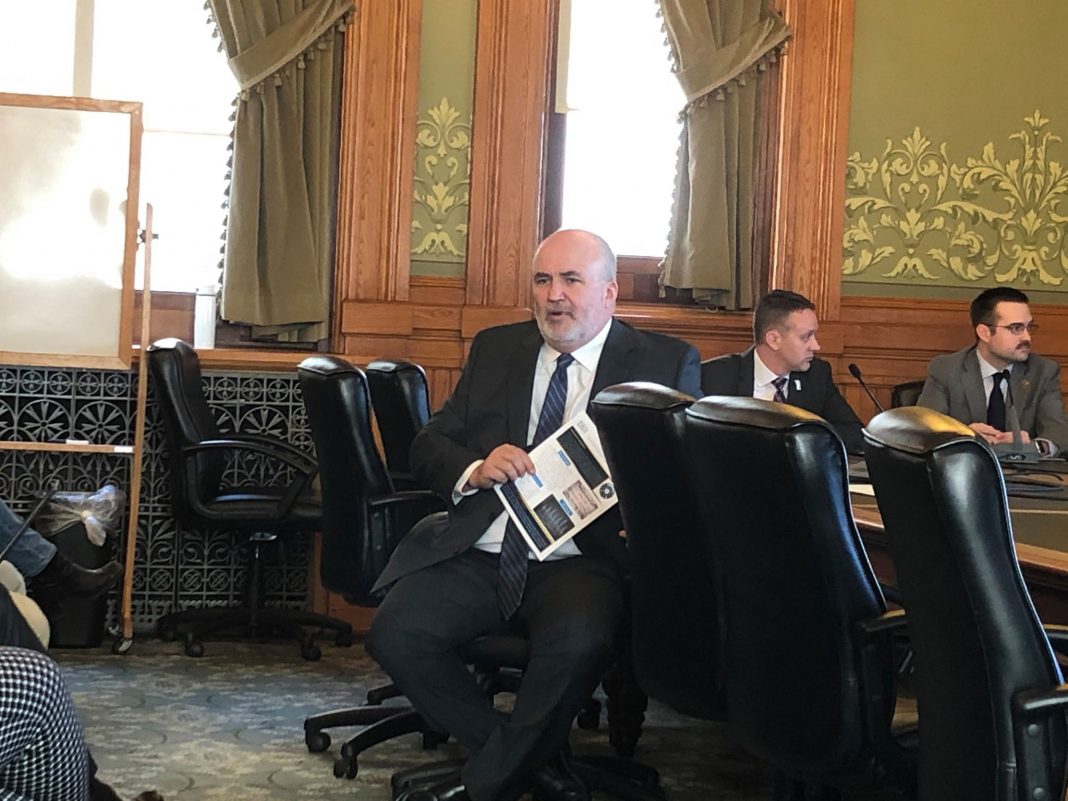Senator Jim Carlin talked at length about why he filed Senate File 406. The bill provides each state or local law enforcement agency must collect data relating to the commission of public offenses by nonresident aliens as defined in Code Section 9I.1.
“The best policy and legislation is defined by truth and reality,” Carlin said. “We’re privy to some pretty good statistical analysis.”
Carlin said 99 percent of meth comes from Mexico. It used to cost $18,000 a pound. The current market price is $2,500 a pound.
“That tells me that the supply is exceeding the demand substantially compared to before,” Carlin said. “It tells me the market for meth is being flooded in the state of Iowa substantially as a product of illegal alien crime. The purpose of the bill is to define the scope, the truth of whether or not there’s a problem, to begin with.”
Carlin said the bill will enable areas within the Department of Public Safety to concentrate resources on problem areas.
“The people of Iowa have a right to know,” Carlin said.
The bill, he said, will bring clarity.
“If there is not a significant threat, if there are not significant problems, then the people who say there are, are going to have to contend with the truth of what this analysis brings forward,” Carlin said. “We shouldn’t let political correctness define what we do. We should be defined by truth and reality.
“If it’s a problem, we’re going to come to know about it. Hopefully, it better addresses the problem we’re talking about. Meth trafficking alone has exploded statewide. That’s just one example.”
Carlin added there is no hint of racist intentions in his bill.
“Anybody who knows me knows that that would not be true,” he said. “Anybody who wants to depict or caricature me that way should probably have a conversation with me first.”
The first speaker, Karen, said she’s from Ames and was pulled over about a year ago. The first question she was asked by the officer was in regard to her legal status. She claimed the officer told her he pulled her over due to broken brake light, but she checked her lights and they were all fine.
“He stopped me based on the color of my skin,” she said. “I am a U.S. citizen. I come from a military family. I am here today also because my son in a few years will be driving. And, like me, we both have brown skin. Is he also going to become a victim to this?”
Luis Gomez, a soccer coach at East High School in Des Moines, said he’s worried about the bill impacting the trust attempting to be built between young kids and the police department.
“Probably 95 percent of the students that I work with are immigrants or come from immigrant families,” he said. “Meaning they’re people of color. This bill, in that sense, would destroy all the trust that we have built with the Des Moines Police Department.”
Valerie Stokes, a professor at Northwestern College in Orange City, said she’s the guardian of a son who is a legal permanent resident. But, he has family here that is illegal.
Stokes said she’d like language added to make it nonidentifying information.
“For all juveniles, when they do something or have committed a crime as a child, we try to protect them,” she said. “Regardless of status, we should be protecting all of our minors to build them up and to become adults involved in communities and into our society.”
Daniel Zenno of the ACLU of Iowa provided strong opposition to the bill.
“The very first step that law enforcement has to figure out is are you a nonresident alien, but not a long-term permanent resident,” he said. “Sen. Carlin’s example was illustrative. We aren’t talking about people who are immigrants from Canada, right? We’re talking about people who have brown skin. Let’s be honest here. This requires racial profiling.”
Connie Ryan of the Interfaith Alliance of Iowa Action Fund added she’s strongly opposed as well.
“I’m sad that we’re talking about this again this year,” she said. “This is a harmful bill. This is a racially biased bill. This is legislation that we should not see. It is beneath the dignity of this body to have this kind of legislation. You may not be or consider yourself to be racist, but when you’re talking about putting into code racial profiling, that action is racist.”
Senator Zach Whiting, who chaired the subcommittee, interrupted to point out that race was unnecessary to the discussion.
“What I’m struggling to find is the word race in the bill,” he said. “I’m struggling to find which race will be profiled. I didn’t see anything in the bill that indicates this is a front-end data collection. It’s back-end.”
Carlin reiterated that the intent of the bill wasn’t for racial profiling.
“This bill is not a pretext for pulling people over because they’re Mexican,” he said. “The point of the bill is to keep statistics so we can find and narrow the scope of whether or not there’s a reality of the problem. We shouldn’t be afraid of the truth. If there’s a problem, let’s deal with it. The reality is whatever the reality is, let’s deal with it.”
As for Carlin being accused of being racist, he addressed those comments as well.
“By the way, I’m also a Senator who proposed minority recruiting for Iowa public schools because we don’t have enough minority teachers in our public schools,” he said. “Just so you know that, to give you some context. So, I want to know, what the reality is and that’s the purpose of this. We do have an obligation to protect the people of Iowa.”
Senator Julian Garrett also spoke in defense of the bill.
“This bill applies to people who have been arrested for something,” he said. “It doesn’t apply to people walking down the street or at Walmart or whatever. It applies to people who have been arrested. It says we want to know the legal immigration status of people who have been arrested.”
Susan Cameron Daemen of the Iowa State Sheriffs’ & Deputies’ Association and Iowa County Attorneys Association said there is no way to collect the data without going through every person.
“It would be profiling if we did not go through every single offense,” she said. “There’s no way we can do this without going through everything and determining if someone is illegal. For that reason, and the cost to do that and all the staff it’s going to take to do that, that is why we went against.”
A woman whose name I did not catch again called the bill racist.
“Our racism is inbred,” the woman said.
Schoolbooks, she said, say this is white history and this is the important history.
Senators Dan Dawson and Whiting signed the bill out of committee.











